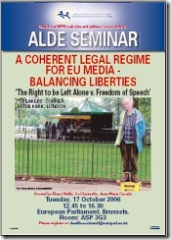Green Paper on Applicable Law in Divorce Matters Unpopular in Brussels
It seems that the European Commission’s proposal to establish common rules on the applicable laws in cross-border divorce (“Rome III”) has met with widespread criticism in Brussels amongst the EU member states. The proposal sets out which national legislation should apply in the case of a couple of two nationalities or a couple living in their non-native country, such as an Irish and Finnish pair of EU civil servants living in Brussels. One may immediately ask why the EU needs to legislate for this at all. The Commission answer thus:
An “international” couple who want to divorce are subject to the jurisdiction rules of the new Brussels II Regulation, which allow the spouses to choose between several alternative grounds of jurisdiction (see point 3.6 of the attached working document). Once a divorce proceeding is brought before the courts of a Member State, the applicable law is determined pursuant to the national conflict-of-law rules of that State. There are significant differences between the national conflict-of-law rules (see point 3.4 of the attached working document). The combination of different conflict-of-law rules and the current jurisdiction rules may give rise to a number of problems in the context of “international” divorces. Apart from the lack of legal certainty and flexibility, the current situation may also lead to results that do not correspond to the legitimate expectations of citizens. Moreover, Community citizens who are resident in a third State may face difficulties in finding a competent divorce court and to have a divorce judgment issued by a court in a third State recognised in their respective Member States of origin. There is finally a risk of “rush to court” under the current situation (Green Paper, p.3).
The Commission’s proposal for the default choice of law rule?
The objective would be to ensure that a divorce is governed according to the legal order with which it has the closest connection. A number of connecting factors, which are commonly used in international instruments and national conflict laws, could be envisaged, such as the spouses’ last common habitual residence, the common nationality of the spouses, the last common nationality if one spouse still retains it or “lex fori”.
The Swedish Justice Ministry study into Rome III highlights some of the causes for concern; in cases involving non-EU citizens or non-EU states, Rome III would also favour a legislature to which both spouses have a strong connection. For exmaple, a Swedish woman marries an Iranian man in Sweden and emigrates to Iran but after several years decides to leave both her spouse and his country and go home. “The proposal means that Iranian divorce law would be applied by the Swedish court,” the justice ministry study states.
Throwing all the different approaches to marriage and divorce into one big melting pot was bound to cause controversies – issues such as forced marriage, or the legality of divorce at all (it is illegal in Malta, for exmaple), or the minimum “separation”period, are all different in each member state, and member states will not want to water down their divoce laws. The Irish Ministry for Justice has, in its press release on the Irish opt-out from Rome III, stated that:
If Ireland were to adopt and implement this measure, this would allow EU nationals resident in Ireland to obtain a divorce in our courts on substantially different and less onerous grounds than that provided for in our constitution.
The cost, and added time needed for finding foreign experts is also a worry, and one of the reasons behind the UK’s opt-out. All in all, Rome III is not the most popular green paper in the playground right now. Is the criticism justified? Comments welcome.
Update: Mark Harper (Withers) has written a summary on the UK Government’s opt-out of Rome III at legalweek.com. He concludes:
This failure by the Government to opt in will mean a two-speed Europe when it comes to family law. The rest of Europe will move forward towards harmonisation of these rules, as opposed to harmonising substantive law, and we will be left behind.

